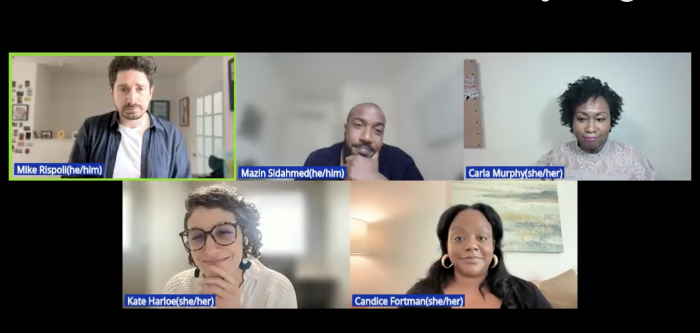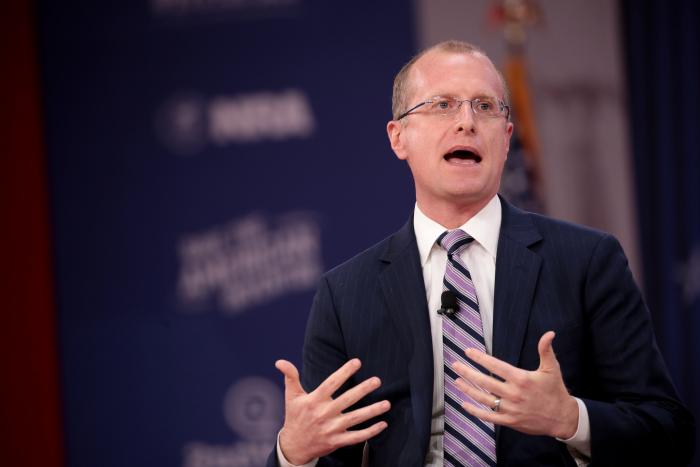On Net Neutrality, Thune Can't Read the Writing on the Wall ... or in His Local Newspaper

Senate Commerce Committee Chairman John Thune told Politico on Wednesday that the average voter isn’t likely to be swayed by the fight to restore Net Neutrality protections.
“I think [Democrats] see it as a really hot political issue [that] gets their base kind of energized," he said, dismissing the wave of popular support for a congressional resolution that would undo last month’s FCC decision to gut the Net Neutrality rules.
Thune claimed there isn’t “a great sense of urgency” spurring people to “go out and vote because of Net Neutrality,” disputing Senate Minority Leader Chuck Schumer’s recent assertion that protecting the open internet “will be a major issue in the 2018 campaigns.”
But when it comes to the wave of support for Net Neutrality, Thune is misreading the writing on the wall ... if he’s reading at all.
Put It in a letter
The senator certainly hasn’t been listening to his constituents in South Dakota, who have joined others across the country to write dozens of letters to the editors of local newspapers urging elected officials to support Net Neutrality, or else.
“Senators, have you polled us? Are you listening?” wrote Missy Slaathaug in an open letter to Thune published in the Argus Leader of Sioux Falls. “We want Net Neutrality. We do not want the regulations protecting Net Neutrality repealed.”
Indeed. Polls show strong majorities of both Republican and Democratic voters oppose the FCC decision to repeal Net Neutrality. A poll from December 2017 found that more than 83 percent of voters favor keeping the rules, including 75 percent of Republicans, 89 percent of Democrats and 86 percent of independents.
“Ending Net Neutrality will not benefit the citizens of South Dakota, but rather it will hurt them by letting corporations choose what can be accessed on the Internet,” wrote Seth Meyers Brandon in the Argus Leader. “Voting against Net Neutrality will directly hinder the freedom of speech over the Internet.”
Slaathaug and Brandon aren’t alone.
People writing to local newspapers everywhere from Olympia, Washington to Columbia, South Carolina are striking a similar tone. Writers from red, blue and purple states alike are submitting letters that hammer local lawmakers for turning a deaf ear to the public on Net Neutrality.
I’ve read nearly all of them.
‘He has not been listening’
Since the FCC repeal came up for a vote on Dec. 14, more than a million people have called Congress to urge their lawmakers to overturn the FCC decision.
Add to that the millions who commented in favor of preserving the 2015 Open Internet Order, and against the Trump FCC’s plan to kill off rules preventing internet service providers from blocking, throttling or otherwise interfering with people’s ability to share and access information online.
“Today I was dismayed to read that Sen. Steven Daines told the Gazette [of Montana] that Democratic efforts to repeal the FCC’s Net Neutrality ruling using the Congressional Review Act was a ‘stunt,’” wrote Glenn Brackett of Butte. “Am I to assume he has not been listening to his constituents? Eighty percent of the public wants Net Neutrality.”
It’s likely that Sen. Daines has been listening — just not to not fellow Montanans. He was elected to the Senate in 2014 with the help of campaign contributions from Koch Industries, a big-money funder of anti-Net Neutrality initiatives.
‘Don’t be fooled’
“The Democrats have argued and are fighting for the old Net Neutrality rules to be put back in place,” Kathy Antinone of Steubenville, Ohio, wrote in a letter to the Herald Star. “After finding out how unpopular this decision was with the public, the Republican Congress wants to rewrite a bill of its own, pretending it’s a compromise. Don’t be fooled.”
Antinone is referring to House legislation introduced by Tennessee Rep. Marsha Blackburn. Blackburn dubbed her bill the “Open Internet Preservation Act,” but it would let companies like Comcast carve the internet into fast lanes for the richest companies and slow lanes for the rest of us.
Sen. Thune has spoken about introducing similar legislation in the Senate as a companion to Blackburn’s bill. The two, who are among the top congressional recipients of campaign contributions from the phone and cable lobby, are eager to rush a bill to President Trump’s desk for signing.
But the growing public outcry may be fouling up their plans.
‘You do not serve us’
“I have seen little effort on your part to improve the lives of middle-class America like you so often promised,” wrote lifelong Republican Reese Boyd of Leoma, Tennessee, to the state’s GOP lawmakers, including Rep. Blackburn, in a letter to the Tennessean.
“This is most evident in the case of Net Neutrality,” Boyd noted. “No one is for the removal of Title 2 classification of internet service providers except for the internet service providers themselves and Republican lawmakers. This makes it obvious to me and many of your other constituents that you do not serve us, but rather you serve the big-moneyed interests.”
Blackburn and Thune aren’t alone among D.C. lawmakers who’ve chosen to ignore their constituents to keep contributions from the phone and cable lobby flowing.
“Every time I called [Rep. Daniel Webster’s] office, his staff had a different message [on Net Neutrality],” wrote Harriet Heywood of Homosassa, Florida, in a letter to the Citrus County Chronicle. “Could it be that Webster didn’t have his lobbyist marching orders yet?”
“While Ajit Pai and others on the FCC voted to take [away] our internet,” she added, “the fight is far from over.”
‘Pathetic’
“Every voter in the 9th District needs to understand this,” wrote Bart Melton of Wytheville, Virginia, to the Roanoke Times. “Representative [Morgan] Griffith signed on to a letter supporting the repeal of Net Neutrality when he had absolutely zero knowledge of the topic. A topic which will have tremendous impact on both the district and the country.”
Roger Bayford of Columbia City, Indiana, wasn’t pleased with the responses he received from Sen. Todd Young and Rep. Jim Banks and he wrote the Fort Wayne Journal Gazette to complain:
“Both praised the FCC for its forward thinking and bragged about how much internet service will improve by striking down existing protections,” he wrote. “Pathetic, isn’t it? This was a real slap in the face when coupled with the law they enacted earlier this year that allows your internet provider to sell all your browsing data.”
That resolution, passed by Congress and signed by Trump last March, overturned the FCC’s landmark 2016 broadband-privacy rules, and gave companies like AT&T, Comcast and Verizon free rein to spy on customers and sell their private information.
Like the December decision to gut Net Neutrality, the anti-privacy vote sparked a massive public outcry that had members of Congress scrambling for cover from withering criticism back home.
‘We will not go down without a fight’
“Eighty percent of Americans support protecting Net Neutrality, including 75 percent of Republicans, yet the FCC and Chairman Ajit Pai pandered to big telecom and cable corporations (and their former employers) against the will of the American people,” Curtis Miller of West Jordan, Utah, wrote to the Salt Lake City Tribune.
Miller urged fellow Utahns to tell the state attorney general to join a lawsuit against the FCC, vote for Net Neutrality candidates and pressure the state legislature to enforce Net Neutrality in Utah. “We will not go down without a fight,” he added.
Thanks to widespread activism across the country, the fight to restore Net Neutrality protections is ramping up.
As of this morning, 45 senators had pledged their support for Sen. Ed Markey’s “resolution of disapproval” to overturn the internet-destroying rules the FCC approved in December. This number includes the first Republican to join the effort, Maine Sen. Susan Collins, who has said she'd vote for the measure when it comes to the floor.
That leaves the Senate just six votes shy of the 51 needed to pass the resolution. Calls from constituents are now flooding into the offices of those who’ve yet to commit.
So the next time Sen. Thune tries to downplay public passion for Net Neutrality he’d be wise to pick up his phone and listen to callers — or to pick up a local newspaper and read the letters to the editor.





